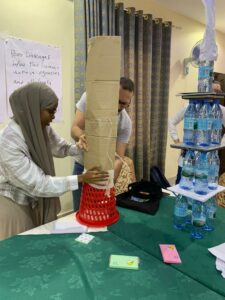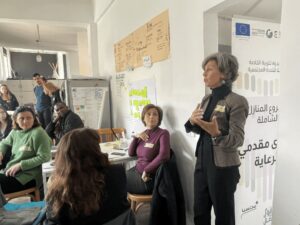The Dutch Relief Alliance is excited to start three new innovation projects that intend to tackle challenges identified in the Somalia, Syria and Ethiopia Protracted Joint Responses. Two more innovation projects are in the pipeline for the South Sudan and Yemen Joint Responses. As the alliance will participate in the RILx23 next week, let’s look closer at what these projects will entail. How do they count on meaningfully taking on challenges faced by these crises?
The innovation projects that will be launched came about through a process of ‘challenge mapping’, a type of problem analysis that comes before introducing an innovation. Lisette Gotink, the Dutch Relief Alliance Innovation Lead, notes on how important this process is in strengthening innovative capacities. “We are now creating more space for innovation in the joint responses by thoroughly understanding the challenges before we search for solutions.”
Previously it was the Dutch Relief Alliance Innovation Fund that funded the innovations projects. However, as of 2022 the goal is to move away from fund-driven innovation to embedding innovations into joint responses. This is not a simple task as delivering humanitarian assistance is rarely long term. Yet, for innovation to successfully be scaled up in the sector, you must ideally look at longer term visions and build-in learning cycles within extended duration of projects says Gotink. For the partners in the Dutch Relief Alliance, innovation is an important strategy in being more effective and efficient, and it looks forward to sharing its experiences at this year’s Response Innovation Lab Global Network Learning Exchange in Nairobi.
Somalia: Sustainable Hydroponic Fodder Production

The Somalian Protracted Response was launched to help people affected by recurrent climate shock of drought and flood. With five consecutive failed rainy seasons, Somalia experiences the longest and most severe drought in its recent history. The production of livestock is Somalia’s main economic activity, however, because of this long-term drought almost 4 million livestock have died. On top of that, extreme weather has reduced the availability of grazing land, making it hard for pastoralists to supply feed to their livestock. The innovation that will be launched to tackle this in a sustainable way is hydroponics fodder production.
Hydroponics fodder production will enable pastoralists to grow animal feed using less water and land with faster growth rates. This will be a novel method of fodder production, as Somalian pastoralists traditionally use direct grazing. Therefore, they will receive training and support on the technicalities surrounding hydroponic fodder production. The long-term vision of the innovation project is to increase the adoption of this method which will lead to long term sustainable effects as more livestock will live, increasing economic activity and reducing food insecurity.
Syria: “one stop shop” female youth centers
Through challenge mapping, partners in Syria found that women face specific barriers in accessing technical and vocational education and training, and that their opportunities are inhibited due to a lack of childcare, transportation, and prevailing gender norms. The Joint Response offers WASH services, nutrition support, and psychosocial support and education. Challenge mapping highlighted how women still faced barriers despite this assistance. The innovation is specifically targeted for women to overcome these barriers.

The innovation includes different components of the “one stop shop” youth centers specifically meant for women. The variety of integrated services include a technical and vocational education training, so that the women may acquire marketable skills and will link them with potential future employers. Mental and psychosocial support will be provided to support the women’s wellbeing and increase their resilience. Additionally, problems regarding gender-based violence will be addressed in the center through awareness trainings and distribution of cash for protection needs. Finally, the centers will also offer ways to strengthen the capacity of Syrian partners in the joint response as it will allow them to meaningfully engage with vulnerable female youths.
Ethiopia: 121 platform https://dutchrelief.org/ethiopia-joint-response-2023/
In Ethiopia the Joint Response was launched because of protracted conflict and drought, affecting people in northern Ethiopia. One key form of support in the response is multi-purpose cash so that households would have some stable income coming in. However, when the Joint Response partners sat down and discussed the challenges facing them, they mentioned that currently cash transfer was less effective. The process of transfer of cash to households was at high risk of human error and time consuming. The innovation to introduced to the Joint Response is the 121 platform. This platform will deliver cash to affected households in an easy and fast manner.
Photo credit: Lisette Gotink (photo 1)/ Ruba Hijazi/ Response Innovation Lab ( photo 2)
Save the Children
Laan van Nieuw Oost-Indië 131-k
2593 BM Den Haag
The Netherlands
Chair organisation: Plan International
E: office@dutchrelief.org